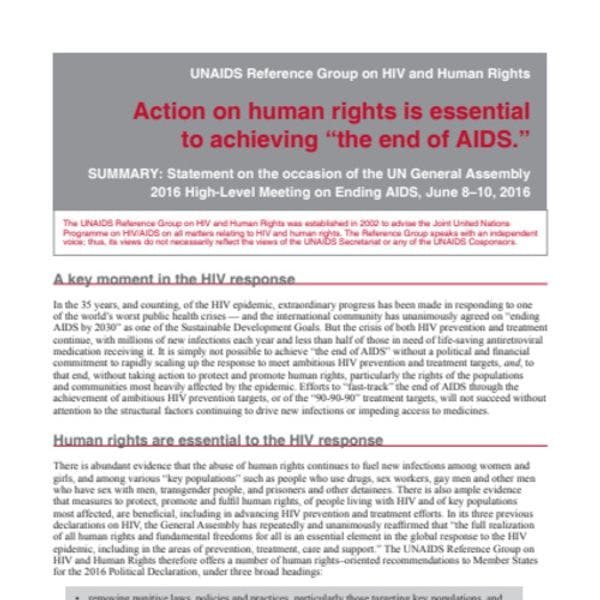High-level meeting on HIV: Contribution of the UNAIDS Reference Group on HIV & Human Rights
The below text is a response from Keith Scott, medical pratictioner and civil society collegue:
In its three previous declarations on HIV, the General Assembly has repeatedly and unanimously reaffirmed that “the full realization of all human rights and fundamental freedoms for all is an essential element in the global response to the HIV epidemic, including in the areas of prevention, treatment, care and support.” The UNAIDS Reference Group on HIV and Human Rights therefore offers a number of human rights-oriented recommendations to Member States for the 2016 Political Declaration, under three broad headings:
§ removing punitive laws, policies and practices, particularly those targeting key populations, and instead creating a more enabling environment through protective laws, policies and practices;
§ accelerating universal access to treatment; and
§ scaling up the human rights programs that are essential to an effective response to HIV.
In the enclosed brief, the UNAIDS Reference Group on HIV and Human Rights explains why each of these areas of human rights concern requires attention, and sets out, in the Annex, specific proposed language for inclusion in the Political Declaration.
This is a key moment in the HIV response. Extraordinary progress has been made in responding to one of the world’s worst public health crises – and the international community has unanimously agreed on “ending AIDS by 2030” as one of the Sustainable Development Goals. But the crisis of both HIV prevention and treatment continue, with millions of new infections each year and less than half of those in need of life-saving antiretroviral medication receiving it. It is simply not possible to achieve “the end of AIDS” without a political and financial commitment to rapidly scaling up the response to meet ambitious HIV prevention and treatment targets, and, to that end, without taking action to protect and promote human rights, particularly the rights of the populations and communities most heavily affected by the epidemic. Efforts to “fast-track” the end of AIDS through the achievement of ambitious HIV prevention targets, or of the “90-90-90” treatment targets, will not succeed without attention to the structural factors continuing to drive new infections or impeding access to medicines.
The human rights approach has brought great success and saved millions of lives. Now is not the time for national governments, donors or the United Nations to back away from the fundamental principles of human rights. We all want to achieve the end of AIDS, but in speaking of an end, we must speak boldly and honestly not only of the successes of the HIV response, but also of the failures—including the ongoing human rights failures—because both successes and failures offer key lessons to galvanize future commitment and action, not only to end AIDS eventually but also to transform and advance global health more broadly, in keeping with the Sustainable Development Goals. Otherwise, we risk falsely declaring “the end of AIDS” while the epidemic becomes another disease of those who are poor and marginalized.
About the UNAIDS Reference Group on HIV & Human Rights
The Reference Group was established in 2002 to advise UNAIDS on all matters relating to HIV and human rights. The membership of the Reference Group brings together people from the HIV and human rights community, including advocates, jurists, ethicists, people living with HIV, people working in the NGO and community sector, people working in the government sector, and academics. The Reference Group speaks with an independent voice. Thus, its views do not necessarily reflect the views of the UNAIDS Secretariat or any of the UNAIDS Cosponsors. The Reference Group advises UNAIDS on how it can strengthen the capacity of governments, civil society and the private sector to protect and promote human rights in relation to HIV, and how it can best operationalize human rights and GIPA (Greater Involvement of People Living with HIV) principles in UNAIDS’ policies and technical support.
Keep up-to-date with drug policy developments by subscribing to the IDPC Monthly Alert.
Downloads
Topics
Regions
Related Profiles
- United Nations
- UNAIDS PCB NGO Delegation
